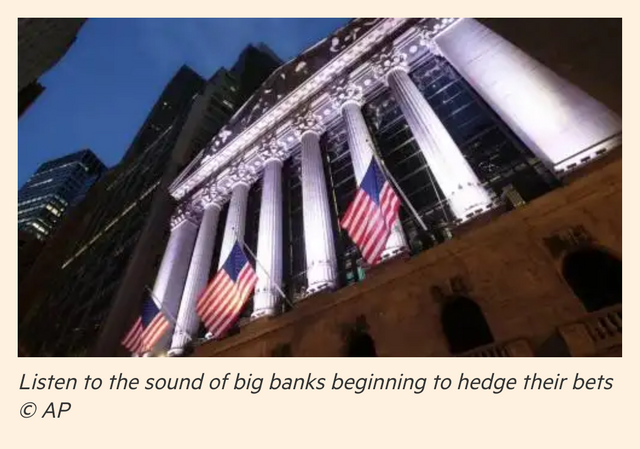Wall Street starts to dip its toes in crypto
Wall Street has never seemed to really care about crypto. Last year Jamie Dimon, head of the biggest bank in America, dismissed bitcoin and other digital currencies as a giant fraud, saying he would fire any trader he caught dealing in them. The JPMorgan Chase chief was at it again last week, noting that unlike gold or the US dollar, crypto assets are not backed by “law, police or the courts”. A few days before that, Goldman Sachs put out a research note citing “cryptocurrency mania” as one of its top risks for the market, on a par with terrorism, populism and cyber attacks.

Behind the scenes, though, there is a much less hysterical tone. Indeed, some of the big banks — Goldman and JPMorgan among them — have begun to dip toes in crypto, facilitating trades in bitcoin derivatives on behalf of their fund manager clients. Some banks have hired trendy young crypto-types to develop as-yet-unspecified arrays of products and services.
And now banks are probing a new frontier: custody, or the business of keeping financial assets safe and accounted for. Analysts say that if the banks get it right, providing services comparable to mainstream custody specialists like BNY Mellon or State Street, they could unlock billions of dollars of investment in crypto from funds required by law to keep assets with a qualified custodian. And hence a whole new world of fees.
The problem with crypto assets is that they do not exist in physical form. Unlike a wad of cash or a stock certificate or a bar of gold, there is nothing to grab hold of: just a unique piece of digital property, a record of transfer from one address to another. Addresses are public “wallets”, identified by a string of numbers and letters, and protected by another string known as the private key. If these keys are lost to hackers, coins are almost impossible to track and recover.
Almost all of the coins stolen to date have been from so-called “hot wallets”, or customer accounts held on crypto exchanges, which are connected to the web. But coins stashed in so-called “cold storage” — on a hard drive, completely separated from the internet — have proved much harder to get at. And this is where an emerging breed of custodians has come in, experimenting with everything from computers in vaults in multiple locations, each protected by randomly regenerating back-up keys, to bunkers in the Swiss Alps, fortified with steel slabs to fend off electromagnetic pulse attacks.
Among the frontrunners are New York City-based ItBit, which received the first custody charter from the New York state regulator three years ago, and Gemini, which got the second.
Goldman and JPMorgan, meanwhile, are among a handful of banks exploring ways to close the gap. First to market could be Nomura, the Japanese broker, which has entered into a three-way venture called Komainu, named after the fearsome, lion-like stone statues that guard the gates of Shinto shrines. Then there is Switzerland’s stock exchange, part of SIX Group — co-owned by 130 banks — which last month announced plans for a venue to trade, settle and store coins.
Platforms are springing up because more and more big investors want them, says Sam McIngvale, San Francisco-based head of Coinbase Custody, which works with ETC, a registered broker-dealer. He says Coinbase is on track to cold-store about $5bn of institutional crypto assets by the end of this year — about one-quarter of the total it currently stores for regular retail investors. “People were saying: ‘Hey, we’re already holding bitcoin with you, we trust you, but we need more; we need a regulatory component, we need monthly statements, we need a different type of insurance’,” he says.
So keep an ear out for the drumbeat of death notices for crypto as an asset class. A site called 99bitcoins keeps a log of “obituaries” — 306 and counting — appearing in the mainstream press. Many of them note bitcoin’s extreme volatility; the price has swung more wildly over the past 100 days than all regular currencies bar the Venezuelan Bolívar.
But listen, too, to the sound of big banks beginning to hedge their bets. Goldman chief executive Lloyd Blankfein appeared at the Economic Club of New York last week, for example, where he noted that money has often “morphed” into unexpected forms. It would be “arrogant”, he said, to assume bitcoin would never make the grade as a medium of exchange, a unit of account or a store of value.
In other words: never mind that crypto is mostly shunned by institutional investors. One day that could change. And Wall Street will be there to cash in, if it does.
Courtesy:https://amp-ft-com.cdn.ampproject.org/c/s/amp.ft.com/content/db5a20ea-9ca1-11e8-9702-5946bae86e6d
Good info nd link buddy
Posted using Partiko Android
Congratulations @grv6124 ! You received a 1% upvote from @kryptoniabot & @kryptonia for your task of 100 SUP Today.
Remember to receive votes from @kryptoniabot
Run a task on Kryptonia.*Join free here Kryptonia Account
Use the tags KRYPTONIA or SUPERIORCOIN in your Steemit post.
Delegate to the Kryptonia Upvote by clicking links: 10SP , 50SP , 100SP , 500SP , 1000SP
Due to an increased amount of tasks, we have changed up the voting power to evenly spread out the Upvote amount.